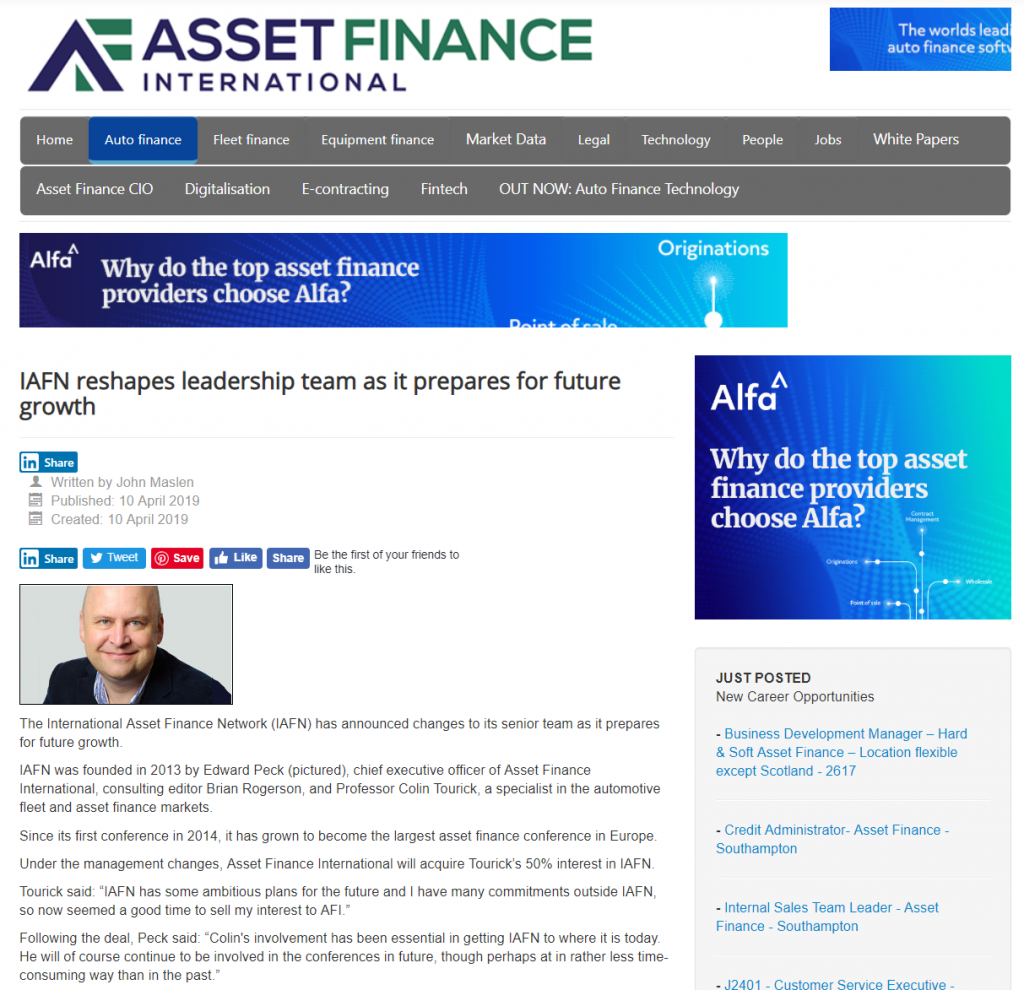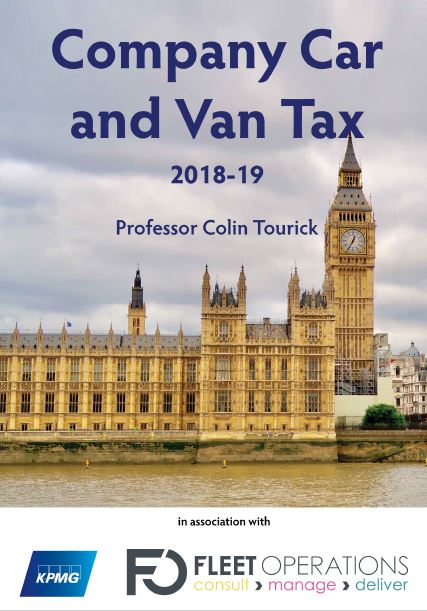August 05, 2021 – TORONTO, ON Volaris Group Inc., through AssetWorks LLC, has acquired Lightbulb Analytics Ltd from Colin Tourick. Lightbulb Analytics (LBA) is one of the United Kingdom’s leading providers of telematics driven data analytics. LBA’s solutions will be integrated … Continue reading
Category Archives: news
Colin’s updated thoughts on Brexit
Article originally published by Fleet News 30 September 2019
https://www.fleetnews.co.uk/guest-opinion/hope-for-the-best-plan-for-the-worst
We are in the vortex of a national crisis. Actually, crises.
* Constitutional – can the PM refuse a direct instruction from Parliament?
* Democratic – which should prevail, the will of the people or the will of their parliamentary representatives?
* Economic – no one seems to know how bad things will be when we leave the EU, (with or without a deal).
* Social – there has been a sharp increase in antisocial behaviour (racism in particular).
* Political – have we ever seen so many disaffected MPs?
This is a particularly British crisis. No riots, no petrol bombs, no tanks on the streets. Perhaps we should be thankful for such small mercies.
Many businesses have yet to assess how leaving the EU will affect them, deal or no deal. Fleet managers are wondering what to do next. Frankly, they have already had a pretty bad year, dealing with the impact of WLTP, sharply rising BIK rates and employers wondering whether to bail out of their company cars and take cash instead.
In the past few months, I’ve found myself giving a piece of advice to managers I’ve rarely given in 40 years in fleet: wait and see what happens. We don’t know if there will be a deal and have no idea what shade of government we’ll see if/when there is a general election.
It seems to me that some of Labour’s policies are a long way from business-friendly. Would a Labour government lead to a reduction in business investment and economic activity? And, if so, how might that affect your business?
The Liberal Democrats are riding high in the polls. They would campaign to hold another referendum and remain in the EU. Would that mean business as usual?
The Conservatives want out, but would they really leave without a deal?
And can any party win a majority?
Waiting and seeing is not the same as doing nothing. There is a lot to do. ACFO’s call for fleets to prepare a disaster recovery plan is spot on. A no deal Brexit will lead to disruption, delays, price hikes and some shortages. We need to hope for the best, plan for the worst and stay flexible. Now is a very good time to delay vehicle replacements.
Colin Tourick admitted to IAFN Hall of Fame
An independent panel of judges awarded this honour to Colin at a glittering event in London in June 2019.
Colin Tourick sells interest in IAFN
The International Asset Finance Network (IAFN) has announced changes to its senior team as it prepares for future growth.
IAFN was founded in 2013 by Edward Peck (pictured), chief executive officer of Asset Finance International, consulting editor Brian Rogerson, and Professor Colin Tourick, a specialist in the automotive fleet and asset finance markets.
Since its first conference in 2014, it has grown to become the largest asset finance conference in Europe.
Under the management changes, Asset Finance International will acquire Tourick’s 50% interest in IAFN.
Tourick said: “IAFN has some ambitious plans for the future and I have many commitments outside IAFN, so now seemed a good time to sell my interest to AFI.”
Following the deal, Peck said: “Colin’s involvement has been essential in getting IAFN to where it is today. He will of course continue to be involved in the conferences in future, though perhaps at in rather less time-consuming way than in the past.”
Last year’s IAFN conference attracted a global audience of more than 400 delegates.

Car subscription services: proceed with caution
Article first published in Fleet Leasing 19 December 2019
Should leasing companies move into the car subscription market? Colin Tourick outlines the risks involved.
There has been a growing interest in car subscription services, also known as car-as-a-service, for a whole host of well-understood reasons.
These include:
- more kids going to university than ever before and leaving with £50,000 of debt
- more people moving to cities, where public transport is plentiful and parking is a nightmare
- the rising cost of car ownership
- people becoming used to paying for things by monthly subscriptions that they can cancel at short notice
- the heavy burden of company car tax.
Under a car subscription, clients are offered cars on no-strings-attached contracts, either for a short, fixed duration of, say, three months or cancellable on demand without penalty. The contracts include full maintenance and servicing, insurance, rapid delivery, a small down payment and either a short, fixed duration (perhaps two or three months) or the flexibility to hand the car back at will.
Millennials were the group most interested in this option, and, as the researchers said, this is “pushing companies to rethink their business model”.
Those companies, of course, include leasing companies.
Leasing companies’ role in the increase in car subscription services
More and more lessors are offering personal contract hire (PCH) and personal contract purchase (PCP) to meet rising demand from consumers and to ensure that, when an employee decides to opt out of their company car, the opportunity to supply them with a car is not lost forever to a manufacturers’ captive finance company.
And now it is being suggested that subscriptions services will be the next ‘big thing’.
LeasePlan recently entered the market with its monthly car subscription service, Subscribe and Drive.
CEO Tex Gunning said: “Increasingly, our customers – whether they are corporate, SMEs or private individuals – would prefer a ‘car-as-a-service’ with no strings attached in terms of car type or duration. They just want ‘any car, anytime, anywhere’.”
Volvo, Wagonex and Drover also offer car subscription services in the UK, while in America the market is currently dominated by car manufacturers, including BMW, Audi, Cadillac, and Porsche.
Should your leasing company get in on the action?
Many fleet leasing companies are looking at how they can get a piece of the action. But should they?
Traditionally, when a leasing company delivered a new car to a fleet client it stayed on hire for three or four years. They collected it at the end of the contract, ideally when delivering the driver’s next car. There is no ‘down time’ in this arrangement: the client pays for the car throughout the hire period and also pays if they want to terminate the arrangement early.
If fleet clients needed cars for shorter periods – perhaps while the driver was waiting for delivery of their new car or to meet some other short-term requirement – they used the services of daily hire companies, and the deal was often arranged by the leasing company.
There is a very good reason for this division between leasing companies and rental companies.
They cater for the needs of very different customers.
Someone who wants a car for three years will be very specific about their requirements. Colour, engine size, fuel, transmission, make, model, derivative, factory-fitted options, and so on. A tailor-made product.
Someone who wants a car for a few days or weeks generally isn’t bothered about most of these things.
They want to car to be of a certain size and quality and to able to transport a certain number of people and a certain amount of luggage, but beyond that they don’t much mind which car they get. That’s why car rental companies offer cars in groups: mini, economy, compact, full-size and so on.
When they tell the consumer they will be getting a ‘Fiat Panda or similar’ they are managing expectations and giving themselves the flexibility to deliver whatever car in that group happens to be available.
“If I was running a fleet leasing business I’d be talking to colleagues in the daily hire sector to discuss how we can meet demand from my clients for flexible leasing, using the rental company’s resources.” Colin Tourick
Daily hire companies have a very large number of cars available, either from their own fleets or by arrangement with other rental companies.
These cars have been bought at massive discounts, new from the manufacturer, and when they come to be sold nine to 12 months later the rental company will have suffered very little depreciation or maintenance cost.
The driver may have collected the car from the rental company’s local depot, or if the client is big enough and has a sufficient number of rental days per year, the rental company might have delivered it to the driver’s place of work.
Rental companies have massive infrastructure to support this: many cars available at short notice, a good spread of depots across the country and a small army of drivers available to move cars. So the direct cost per hire and vehicle movement is low.
Most fleet lessors have none of these natural advantages. They buy cars at good prices, certainly, but normally nothing like the prices paid by rental companies.
When a driver signs up for a subscription service from a leasing company and wants a car for, say, three months, they are likely to want to choose their own car rather than leaving the choice to the supplier.
But the leasing company is not going to be able to let the driver configure the car they want, because no other driver of that car in future may want that particular spec. How is the lessor to deal with this? Buy more cars than it needs, or try to channel clients into taking cars that don’t meet their specific needs?
Neither option is good.
The driver is likely to want to have the car delivered, which means it will need to be moved – at the lessor’s expense – several times each year.
Giving the client the flexibility to end the contract on demand, at little or no cost, means giving them the opportunity to cause financial pain to the lessor.
The way to avoid all of this pain is for the lessor to charge rentals that are high enough to cover all of the additional costs that are implicit in the delivery of this type of product. But those costs are going to have to be very high indeed to ensure they cover void periods and the need to move cars long distances around the country. It will be hard to make them look competitive against the cost of, say, a conventional three-year lease or indeed a corporate daily hire rental.
One way to reduce some of these costs is for the lessor to show, on their website, the vehicles they currently have available.
If a driver happens to want one of those, great, but if they don’t, will the lessor be willing to let the driver click off that site and onto a competitors’ site or will they try to retain the client by offering them the chance to specify the particular car they want? That way they’ll win the deal, but at what cost?
And will fleet lessors ever really be able to compete with daily rental companies for this type of business, given the massive advantages those companies have – both infrastructure and price?
This is a risky product for the fleet leasing industry as currently configured.
Just because there is demand for something, it shouldn’t automatically follow that lessors should be clamouring to buy new cars (or allocate used cars) and set up departments to meet that demand.
The risks here are high, the revenues uncertain and the opportunity for losses are great.
Also, this product isn’t new. A number of companies have been set up over the years to offer ‘flexible leasing’, and none of them has been particularly successful. One or two have failed spectacularly,
If I was running a fleet leasing business I’d be talking to colleagues in the daily hire sector to discuss how we can meet demand from my clients for flexible leasing, using the rental company’s resources.
Synergy Automotive hits service highs
Great news about a small business in the leasing sector delivering world class-customer service.
https://www.yorkshirepost.co.uk/news/synergy-beats-top-firms-for-service-index-1-9364776
Quote in Fleet World
Press coverage of Company Car and Van Tax 2018-19
Company Car and Van Tax 2018-19 is published
The 8th annual edition of Company Car and Van Tax has just been published by Eyelevel Books, in conjunction with KPMG, Ogilvie Fleet, Low Cost Vans and Fleet Operations.
Company Car and Van Tax 2018-19 has been fully updated and includes information on optional remuneration, salary sacrifice and car allowances.
The book covers everything a fleet manager or company vehicle driver needs to know about tax, including car benefit tax, fuel benefit tax, VAT, income tax, corporation tax, capital allowances, fuel duty, vehicle excise duty and national insurance contributions.
Published in conjunction with KPMG, Fleet Operations, Low Cost Vans and Ogilvie Fleet, and is available from amazon.co.uk, tourick.com and all good bookshops, priced at £50 paperback or £50 PDF ebook.
PDF is available now for immediate download.
Colin Tourick appointed Honorary Fellow of the ICFM
At the annual conference of the Institute of Car Fleet Management, Colin was appointed an Honorary Fellow of the Institute, entitled to use the designation FICM after his name.
Press coverage:






